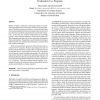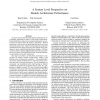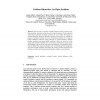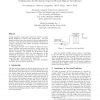75 search results - page 4 / 15 » Accurate Indirect Branch Prediction |
POPL
1994
ACM
13 years 11 months ago
1994
ACM
Modern computer architectures increasingly depend on mechanisms that estimate future control flow decisions to increase performance. Mechanisms such as speculative execution and p...
ICS
2009
Tsinghua U.
13 years 5 months ago
2009
Tsinghua U.
Modern processors require highly accurate branch prediction for good performance. As such, a number of branch predictors have been proposed with varying size and complexity. This ...
MICRO
1995
IEEE
13 years 11 months ago
1995
IEEE
Accurate instruction fetch and branch prediction is increasingly important on today’s wide-issue architectures. Fetch prediction is the process of determining the next instructi...
APCSAC
2007
IEEE
14 years 2 months ago
2007
IEEE
The majority of currently available dynamic branch predictors base their prediction accuracy on the previous k branch outcomes. Such predictors sustain high prediction accuracy but...
ISCA
1997
IEEE
13 years 11 months ago
1997
IEEE
Deeply pipelined, superscalar processors require accurate branch prediction to achieve high performance. Two-level branch predictors have been shown to achieve high prediction acc...




